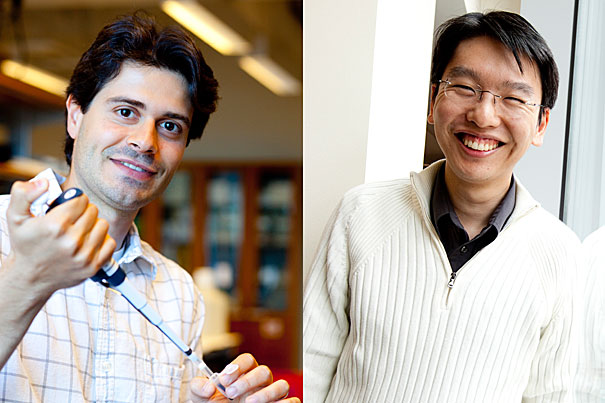
John Calarco (left), a Bauer Fellow at the Faculty of Arts and Sciences Center for Systems Biology, and Harris Wang, a Technology Development Fellow at the Wyss Institute for Biologically Inspired Engineering, were among the first 10 researchers to receive NIH Director’s Early Independence Awards.
Photos by Rose Lincoln/Harvard Staff Photographer
Early excellence, rewarded
Harvard researchers receive NIH grants to support junior researchers
Two young Harvard scientists will each receive $2.54 million or more in National Institutes of Health (NIH) grants that will support research and overhead costs through a new program intended to accelerate the entry of outstanding junior investigators into independent researcher positions.
John Calarco, a Bauer Fellow at the Faculty of Arts and Sciences Center for Systems Biology, and Harris Wang, a Technology Development Fellow at the Wyss Institute for Biologically Inspired Engineering, were among the first 10 researchers to receive NIH Director’s Early Independence Awards. The awards effectively allow winners to leapfrog over the traditional postdoctoral training period, and are designed to capitalize on the creativity, confidence, and energy of young scientists.
Calarco, who will receive approximately $400,000 per year over five years, said the grant will allow him to continue research he began as part of his Ph.D. effort that examines gene regulation of cells in the nervous system, and how various classes of neurons are formed.
Of particular interest to Calarco is an aspect of gene regulation called alternative RNA splicing, a process in which RNA is chopped up and stitched back together in different combinations, contributing to increased cellular complexity from a more limited set of genetic building blocks. Calarco’s research examines how the splicing process shapes neuronal identity in worms, but could lead to breakthroughs in the cause and treatment of human neurological disorders.
“By better understanding splicing regulation in the nervous system, which occurs both in worms and humans, we can gain more insights into how this process operates, and how it may go awry in certain disorders,” he said. “Ultimately, we may be able to develop appropriate strategies to address these challenges in the future.”
While any such breakthrough is still years away, Calarco said it was gratifying to receive the recognition of the award.
“It’s a great feeling to be recognized among a group of young researchers that are very, very talented in so many diverse fields,” he said. “I actually received the call just as I was walking into my office from a day in the lab, so it was a pleasant surprise at the end of the day.”
Wang will receive the same grant amount, which will fund research aimed at improving human health by using new synthetic-biology tools to enhance the ability of common human-associated microbes like gut bacteria to fight diseases and to better modulate metabolism of foods and drugs.
“Microbes are everywhere on our bodies, and some are essential for good health, while others can cause disease,” Wang said. “Being able to control and engineer beneficial microbes is a key step toward developing better and smarter bio-based therapeutics.
“It is extremely important for the NIH to provide funding for younger investigators because it provides a unique level of early financial support and research independence outside of the traditional track,” Wang added. “The average age for investigators to receive their first major NIH grant is around 40. With this award, young investigators such as myself will have the opportunity to develop high-risk but potentially high-reward research programs much earlier in their careers.”




